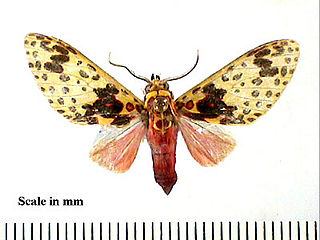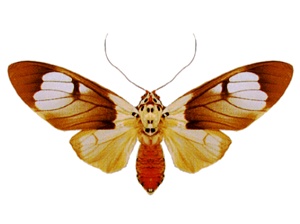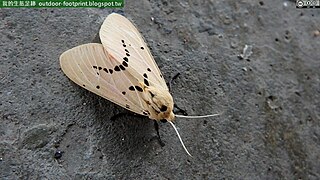
Aemilia is a genus of tiger moths in the family Erebidae described by William Forsell Kirby in 1892. It was initially named Ameles, but this name properly refers to a praying mantis genus.

Amaxia is a genus of moths in the family Erebidae erected by Francis Walker in 1855. The type species of the genus is Amaxia pardalisWalker, 1855.

Amerila is a genus of moths in the subfamily Arctiinae. A number of species in this genus have a special defence mechanism when they are in their adult stage. When disturbed, they exude a frothy yellow fluid from glands beside the eyes, while making a sizzling noise to ward off their attacker. Similar behaviour has been observed in fertilised females of the North-American moth Utetheisa ornatrix.
Amsacta is a genus of tiger moths in the family Erebidae erected by Francis Walker in 1855. The genus contains several species that need a review.

Cyana is a genus of moths in the family Erebidae. Species are well distributed in Africa, Madagascar, China, India, Sri Lanka, Myanmar, Sumatra, Java and Borneo. The genus was erected by Francis Walker in 1854.
Hemihyalea is a monotypic moth genus in the family Erebidae erected by George Hampson in 1901. Its only species, Hemihyalea cornea, was first described by Gottlieb August Wilhelm Herrich-Schäffer in 1853.

Lophocampa is a genus of moths in the family Erebidae. The genus was erected by Thaddeus William Harris in 1841. It contains around 75 species.
Monosyntaxis is a genus of moths in the family Erebidae. The genus was erected by Swinhoe in 1901.

Ephestia is a genus of small moths belonging to the family Pyralidae. Some species are significant pests of dry plant produce, such as seeds and cereals. Best known among these are probably the cacao moth and the Mediterranean flour moth.

Spilarctia is a genus of moths in the family Erebidae. The genus was erected by Arthur Gardiner Butler in 1875.

Eristena is a genus of moths of the family Crambidae.

Udea is a genus of snout moths in the subfamily Spilomelinae of the family Crambidae. The genus was erected by Achille Guenée in 1845. The currently known 215 species are present on all continents except Antarctica. About 41 species are native to Hawaii.

Pyrausta is a speciose genus of moths of the family Crambidae. The genus was erected by Franz von Paula Schrank in 1802.

Paracymoriza is a genus of moths of the family Crambidae.

Pilocrocis is a genus of moths of the family Crambidae. The genus was first erected by Julius Lederer in 1863.
Asteropetes is a monotypic moth genus of the family Noctuidae erected by George Hampson in 1901. Its only species, Asteropetes noctuina, was first described by Arthur Gardiner Butler in 1878. It is found on the Kuriles and in Japan.

Phytometra is a genus of moths of the family Erebidae. The genus was described by Adrian Hardy Haworth in 1809.
Schalifrontia is a monotypic moth genus of the family Noctuidae. Its only species, Schalifrontia furcifer, is found in the Brazilian state of Santa Catarina. Both the genus and species were first described by George Hampson in 1901.

Prasinoxena is a genus of moths in the family Pyralidae. The genus was created by Edward Meyrick in 1894.
Heosphora is a genus of moths in the family Pyralidae. The genus was first described by Edward Meyrick in 1882. The type species is Anerastia psamathella Meyrick, 1879, designated as such by George Hampson in 1901. All Heosphora species are found in Australia.











